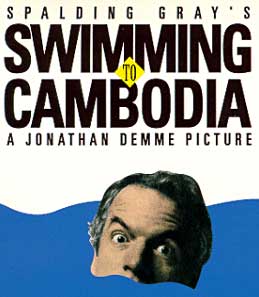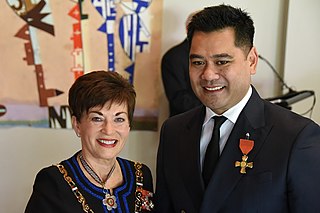Related Research Articles

The performing arts are arts such as music, dance, and drama which are performed for an audience. They are different from the visual arts, which are the use of paint, canvas or various materials to create physical or static art objects. Performing arts include a range of disciplines which are performed in front of a live audience, including theatre, music, and dance.

The Somonyng of Everyman, usually referred to simply as Everyman, is a late 15th-century morality play. Like John Bunyan's 1678 Christian novel The Pilgrim's Progress, Everyman uses allegorical characters to examine the question of Christian salvation and what Man must do to attain it.

Our Town is a three-act play created by American playwright Thornton Wilder in 1938. Wilder was awarded the 1938 Pulitzer Prize for Drama for this play. "Our Town" tells the story of the fictional American small town of Grover's Corners between 1901 and 1913 through the everyday lives of its citizens. It is an essential play about how we must embrace and appreciate the value of life itself.

Laurel Philips Anderson, known as Laurie Anderson, is an American avant-garde artist, composer, musician, and film director whose work spans performance art, pop music, and multimedia projects. Initially trained in violin and sculpting, Anderson pursued a variety of performance art projects in New York during the 1970s, focusing particularly on language, technology, and visual imagery. She became more widely known outside the art world when her song "O Superman" reached number two on the UK singles chart in 1981. Her debut album Big Science was released the following year. She also starred in and directed the 1986 concert film Home of the Brave.

Performance poetry is a broad term, encompassing a variety of styles and genres. In brief, it is poetry that is specifically composed for or during a performance before an audience. During the 1980s, the term came into popular usage to describe poetry written or composed for performance rather than print distribution, mostly open to improvisation.

Spalding Gray was an American actor, novelist, playwright, screenwriter and performance artist. He is best known for the autobiographical monologues that he wrote and performed for the theater in the 1980s and 1990s, as well as for his film adaptations of these works, beginning in 1987. He wrote and starred in several, working with different directors.

In narratology and comparative mythology, the hero's journey, or the monomyth, is the common template of stories that involve a hero who goes on an adventure, is victorious in a decisive crisis, and comes home changed or transformed.

In his own time, William Shakespeare (1564–1616) was rated as merely one among many talented playwrights and poets, but since the late 17th century has been considered the supreme playwright and poet of the English language.

Swimming to Cambodia, also known as Spalding Gray's Swimming to Cambodia, is a 1987 American concert film written by and starring Spalding Gray, and directed by Jonathan Demme. The performance film is of Gray's play and monologue, which centered on such themes as his trip to Southeast Asia to create the role of the U.S. Ambassador's aide in the film The Killing Fields, the Cold War, Cambodia Year Zero, and his search for his "perfect moment". It was nominated for Best Feature, Best Director, Best Actor, and Best Screenplay at the 1988 Independent Spirit Awards.

Dramaturgy is a sociological perspective commonly used in micro-sociological accounts of social interaction in everyday life.

Philippine "Pina" Bausch was a German dancer and choreographer who was a significant contributor to a neo-expressionist dance tradition now known as Tanztheater. Bausch's approach was noted for a stylized blend of dance movement, prominent sound design, and involved stage sets, as well as for engaging the dancers under her to help in the development of a piece, and her work had an influence on modern dance from the 1970s forward. Her work, regarded as a continuation of the European and American expressionist movements, incorporated many expressly dramatic elements and often explored themes connected to trauma, particularly trauma arising out of relationships. She created the company Tanztheater Wuppertal Pina Bausch, which performs internationally.

Cinema in Cambodia began in the 1950s, and many films were being screened in theaters throughout the country by the 1960s, which are regarded as the "golden age". After a near-disappearance during the Khmer Rouge regime, competition from video and television has meant that the Cambodian film industry is a small one.

Anastas Alekseevich Mikoyan, also known professionally as Stas Namin is a Russian rock musician, known as the leader of the popular Soviet music group, Tsvety. He is also a composer, actor, record producer, and director, and lends his name to the theatre he created in Moscow, the Stas Namin Music and Drama Theatre.

Neil Ieremia, ONZM, is one of New Zealand’s most accomplished choreographers, a creative entrepreneur and inspirational leader. He is the founder, artistic director and chief executive of internationally acclaimed contemporary dance company, Black Grace.
Marc Israel is a filmmaker and musician. He started his career as a traveling "one-man band", but later changed his focus to making documentaries and films about his life.
American Sign Language literature is one of the most important shared cultural experiences in the American deaf community. Literary genres initially developed in residential Deaf institutes, such as American School for the Deaf in Hartford, Connecticut, which is where American Sign Language developed as a language in the early 19th century. There are many genres of ASL literature, such as narratives of personal experience, poetry, cinematographic stories, folktales, translated works, original fiction and stories with handshape constraints. Authors of ASL literature use their body as the text of their work, which is visually read and comprehended by their audience viewers. In the early development of ASL literary genres, the works were generally not analyzed as written texts are, but the increased dissemination of ASL literature on video has led to greater analysis of these genres.
Sini Anderson is an American film director, producer, performance artist, choreographer, dancer and poet, from Chicago, Illinois. Anderson is widely known for directing The Punk Singer (2013), a documentary about riot grrrl musician Kathleen Hanna's legacy and experience with late-stage Lyme disease.
The 2012 Cultural Olympiad was a programme of cultural events across the United Kingdom that accompanied the 2012 Summer Olympics and 2012 Summer Paralympics.
Town Bloody Hall is a 1979 documentary film of a panel debate between feminist advocates and activist Norman Mailer. Filmed on April 30, 1971, in The Town Hall in New York City. Town Bloody Hall features a panel of feminist advocates for the women's liberation movement and Norman Mailer, author of The Prisoner of Sex (1971). Chris Hegedus and D. A. Pennebaker produced the film, which stars Jacqueline Ceballos, Germaine Greer, Jill Johnston, Diana Trilling, and Norman Mailer. The footage of the panel was recorded and released as a documentary in 1979. Produced by Shirley Broughton, the event was originally filmed by Pennebaker. The footage was then filed and rendered unusable. Hegedus met Pennebaker a few years later, and the two edited the final version of the film for its release in 1979. Pennebaker described his filming style as one that exists without labels, in order to let the viewer come to a conclusion about the material, which inspired the nature of the Town Bloody Hall documentary. The recording of the debate was intended to ensure the unbiased documentation, allowing it to become a concrete moment in feminist history.
Kosal Khiev is a Cambodian spoken word artist.
References
- ↑ "From teenage gangster to exiled poet: New documentary follows Kosal Khiev | Al Jazeera America". america.aljazeera.com. Retrieved 2014-05-11.
- ↑ Romani, Rebecca. "Review: Cambodian Son". KPBS. Retrieved 12 September 2020.